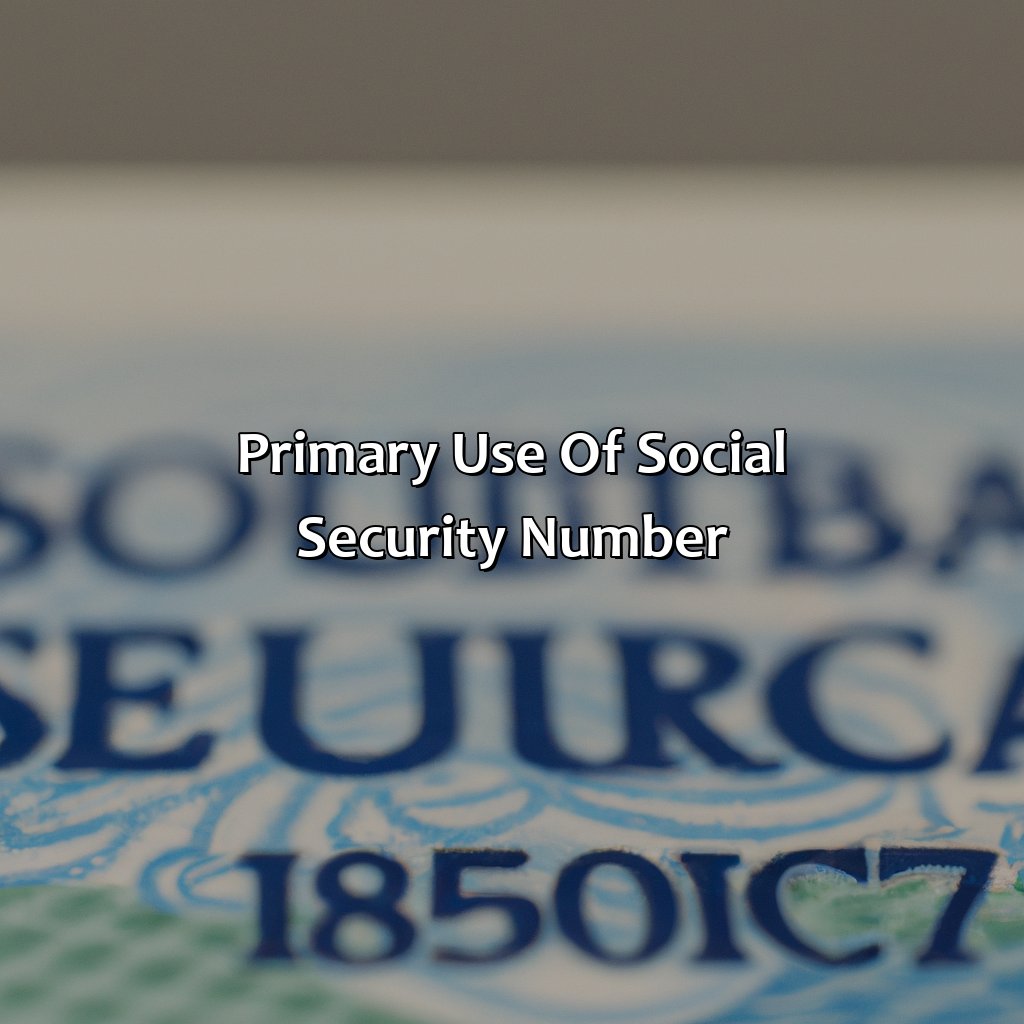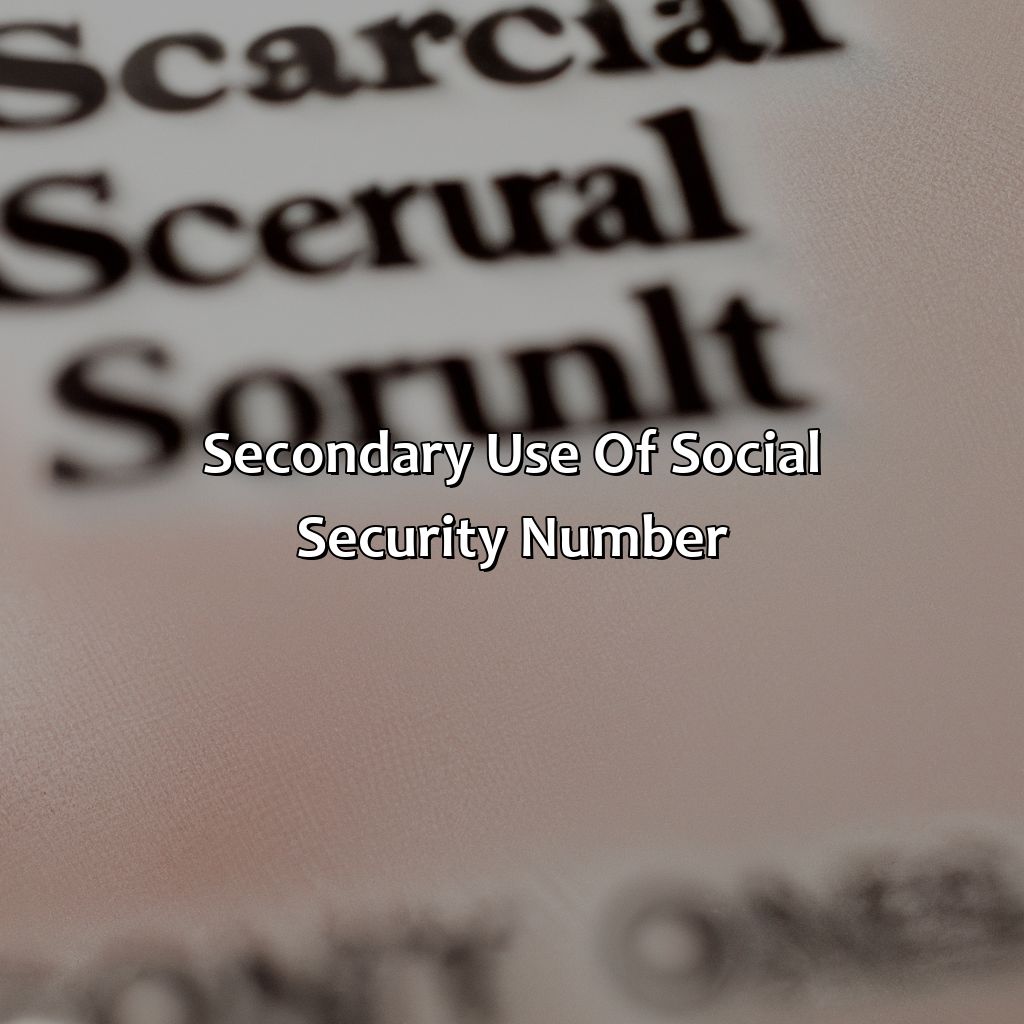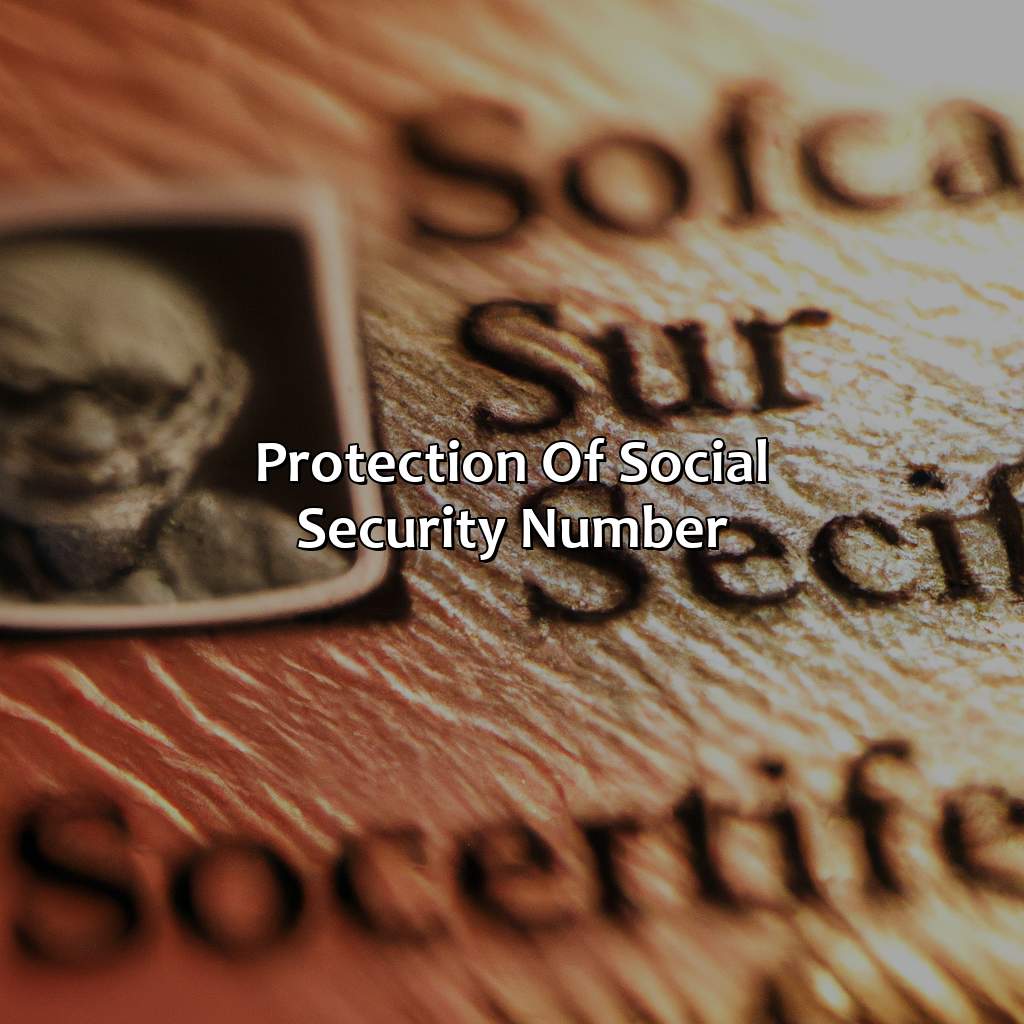What Do You Use Your Social Security Number For?
Key Takeaway:
- A Social Security Number (SSN) is a 9-digit identification number assigned by the US government, primarily used for employment and income tax purposes but also required for many other important activities.
- The primary uses of SSN include employment and income tax reporting, accessing bank and financial accounts, accessing government benefits and services, and gaining entry to educational and healthcare institutions.
- Secondary uses of SSN include credit history and loan applications, background checks for employment or security clearance, and jury selection and legal proceedings. It is important to protect your SSN by following fraud prevention tips, monitoring your credit reports, and reporting any stolen or misused SSNs.
Are you wondering what your Social Security Number is used for? You may be surprised to learn all the ways your SSN is used for more than just identification. Read on to find out more and how to protect yourself from potential misuse or fraud.
Legal Requirements for Social Security Number
Possession of SSN:
In order to legally work and receive income in the United States, you are required to have a Social Security Number (SSN). It is a unique identifier issued by the Social Security Administration (SSA) to American citizens, permanent residents, and temporary residents with work authorization.
Use of SSN:
The use of SSN goes beyond just employment and income. It is also required to apply for a driver’s license, open a bank account, apply for federal benefits or loans, and file tax returns. Additionally, SSN is used by government and non-government agencies to verify identity and perform credit checks.
Protection of SSN:
It is crucial to protect your SSN to prevent identity theft and fraud. Do not give your SSN to anyone unless it is necessary, and keep your SSN card in a secure location. If your SSN is stolen or misused, you should report it to the SSA, the Federal Trade Commission, and the credit bureaus. Remember to monitor your credit report and financial statements regularly for any suspicious activity.
Real-Life Example:
A college student received a letter from the IRS stating that multiple tax returns were filed under her SSN. She later found out that her SSN was stolen during a data breach at a medical facility where she received treatment. The student spent months resolving the issue, including filling out identity theft forms and speaking with government agencies. This experience highlights the importance of protecting one’s SSN and being vigilant about monitoring for identity theft.

Image credits: retiregenz.com by Yuval Duncun
Primary Use of Social Security Number
Unlock the mystery of your Social Security Number! Check out “What do you use your Social Security Number for?” This article will show you how your SSN is used for various tasks such as:
- Job opportunities
- Taxes
- Bank accounts
- Government benefits
- and more.
Plus, education and healthcare institutions also use it.

Image credits: retiregenz.com by Yuval Washington
Employment and Income Tax Purposes
For the purpose of attaining employment, obtaining government benefits and fulfilling income tax liabilities, Social Security Numbers or SSNs play a pivotal role in establishing one’s identity in the United States. This unique nine-digit identification number is used by employers to verify employee work eligibility, report wages to the Social Security Administration and facilitate payroll deductions for federal taxes. Similarly, individuals are required to furnish their SSN when filing income tax returns and applying for government-subsidized services.
Moreover, a valid social security number enables an individual to access various financial services such as opening bank accounts, applying for loans and credit cards, obtaining a driver’s license or passport and even for activities like voter registration. It acts as a shield against wrongful identification theft attempts which pose risks to one’s financial stability. The significance of maintaining confidentiality of your SSN should be emphasized upon as it can lead to fraudulent activities done under your name.
Pro Tip: Protect your social security number at all times by not sharing it with unauthorized entities and shredding documents that contain sensitive information.
Bank accounts are like relationships, you need to trust them with your heart and your social security number.
Bank and Financial Accounts
When it comes to using Social Security numbers, one common area is for managing financial accounts. This includes tasks such as opening a bank account, applying for loans or credit cards, and conducting financial transactions. Your Social Security number serves as a unique identifier that helps banks and other institutions verify your identity and manage your accounts securely. It also enables them to keep track of important financial information connected to your name.
Apart from using Social Security numbers for basic banking activities, they are also required by law in certain instances, such as claiming government benefits or paying taxes. When used correctly, your SSN can help ensure the safety of your financial data and protect you from potential fraud or identity theft.
However, it’s important to remember that sharing your SSN with anyone who asks isn’t always necessary or safe. Always be cautious before giving out sensitive personal information and only do so when necessary.
According to the Federal Trade Commission (FTC), people aged 20-29 are at the highest risk of losing money to fraudulent activity.
“Nothing says ‘I love Big Brother’ like using your social security number to access government benefits and services.”
Government Benefits and Services
Accessing government benefits and services involve different uses of social security numbers. These might include tax records, applying for welfare or disability payments, healthcare records or even job applications in some cases. The Social Security Administration offers a broad range of services that require social security numbers, including retirement benefits and online accounts management.
When claiming government benefits, the social security number serves as the primary identifier needed for verification purposes. For instance, applicants must provide their SSN when applying for Social Security Disability Insurance (SSDI) or Supplemental Security Income (SSI) payments. Similarly, applying for Medicare requires supplying one’s SSN as well.
It is essential to note that using someone else’s SSN to access benefits or services is illegal and can lead to fines and criminal charges against both parties involved. Government agencies use robust identity verification methods to prevent fraud and ensure that only eligible individuals receive the assistance they need.
Failing to avail oneself of necessary government benefits can have long-term negative effects on one’s financial security or physical wellbeing. As such, it is necessary to stay informed about available services that match one’s needs while following due processes by providing an accurate and up-to-date social security number.
By learning how crucial an SSN is in accessing government benefits and services, individuals can take steps early on to ensure that their eligibility status is current while avoiding any legal difficulties associated with fraud or theft of other people’s personal information. Stay vigilant; always protect your social security number from unlawful access by unauthorized persons who may misuse it out of ignorance during requests or alternative purposes beyond its intended use.
Looks like my social security number is more valuable to schools and hospitals than my actual health and education.
Education and Healthcare Institutions
For Educational and Medical Institutions, the social security number is commonly used as a unique identifier to manage personal and medical records. It helps with various administrative tasks such as enrollment, billing, managing health plans, etc. These institutions are required by law to keep confidential any personal information related to the social security number.
Additionally, healthcare providers utilize social security numbers to validate insurance coverage before performing medical procedures on patients. A patient’s social security number also aids in verifying their identity through state identification services and helps establish authenticity concerning their name, address, and demographic data.
It’s crucial to protect the confidentiality of social security numbers as theft or misuse of this information can have severe consequences for individuals. In an ever-increasing digitized world where sensitive data is always under threat from hackers and other cybercriminals, it’s essential that these institutions use up-to-date technology infrastructure that safeguards confidential information of patients/learners while still allowing access to authorized staff members.
Fun fact: In 1936 when Social Security was created initially, SSNs were not meant to become nationally recognized identification documents. However, due to lack of widespread personal computers/regulation at the time combined with convenience led them into becoming frequently applied identification markers in various institutions across America!
Looks like the government trusts my social security number more than my ex-boyfriend trusts me with his Netflix password.
Secondary Use of Social Security Number
The Secondary Use of Social Security Number was created to tackle when your SSN is needed. It has three parts that explain their uses in detail:
- Credit History and Loan Apps
- Background Checks for Jobs/Security Clearance
- Jury Selection/Legal Proceedings

Image credits: retiregenz.com by Harry Washington
Credit History and Loan Applications
As part of the secondary use of social security numbers, they play a crucial role in your credit history and loan applications. These numbers act as unique identifiers helping lenders in delving into the creditworthiness and financial credibility of individuals applying for loans or mortgage. In other words, SSNs are used as the primary means to access an individual’s credit report; hence they prove to be lifelines for people seeking financing options.
Lenders utilize SSNs in various ways while scrutinizing an applicant’s financial background. They verify if there are any defaults or bankruptcies associated with the applicant’s previous transactions and evaluate their payment patterns to determine the risk involved in lending them funds. They may even use this information to negotiate on terms and interest rates, depending on the borrower’s creditworthiness.
It is worth noting that when we apply for loans or mortgages, lenders or institutions access our credit scores via SSNs. Hence keeping a close check on your SSN usage for loan applications can help you monitor your financial health more efficiently.
Pro Tip: Regularly track your credit score by checking your credit reports from different accounting bureaus annually. A good score helps lenders approve quicker with better loan terms and interest rates, indulging in smart borrowing practices that promote sound personal finance management.
“I didn’t think my social security number would be the only thing keeping me from my dream job, but here we are.”
Background Checks for Employment or Security Clearance
Employers and government agencies conduct personnel screenings or security clearance for job applicants. The process involves scrutinizing an individual’s background, employment history, and personal details to ensure that they meet the work standards and ethical principles required by the company or agency. These processes are essential in filling positions that deal with sensitive information or require handling classified documents. Such checks ensure that individuals meet the minimum requirements necessary to carry out the job responsibilities.
In some cases, employers may conduct thorough investigations beyond work experience and educational background. They may perform criminal record searches, verify citizenship status, and confirm social security numbers (SSN) provided by job applicants. SSN verification is crucial as it helps companies identify an applicant’s identity and prevents fraudulent activities such as using someone else’s SSN number.
Pro Tip: It is always a good idea to maintain up-to-date records of your employment history, educational background and other personal details needed for a potential employer’s background check process.
Getting selected for jury duty is like winning the worst lottery ever, but at least you don’t have to give out your social security number…yet.
Jury Selection and Legal Proceedings
Social Security Numbers play a crucial role in Jury Selection and Legal Proceedings. They are used to verify jury members’ identity, check for criminal records, and ensure that potential jurors are eligible to serve. This helps maintain the integrity of the legal system.
Moreover, Social Security Numbers are used by courts and legal agencies to track individuals involved in legal proceedings. This includes defendants, witnesses, and lawyers who handle the case. It also helps in processing legal documents like court orders or judgments without any confusion.
A crucial point to note is that using someone’s Social Security Number without their consent is illegal under federal law. So it’s vital to be cautious about how your SSN is being used in legal proceedings or other scenarios.
You don’t want to miss out on important updates related to your SSN data being used in jury selection or other legal procedures where it is necessary. Stay informed about your rights and consult with a lawyer if needed.
Remember that it’s always better to be safe than sorry when it comes to your personal information and its use by third parties. Take necessary steps to secure your SSN as well as other sensitive data as much as possible.
Your Social Security Number is more protected than a celebrity’s privacy in Hollywood.
Protection of Social Security Number
Secure your social security number! To do this, the ‘Protection of Social Security Number’ section contains two subsections:
- Fraud Prevention Tips
- Reporting Stolen or Misused Social Security Numbers
These provide methods to stop fraud and report the theft of your number.

Image credits: retiregenz.com by James Woodhock
Fraud Prevention Tips
Protect Your Identity with these Fraud Prevention Techniques.
- Always safeguard your Social Security Number and do not carry it around in your wallet or simple notes app. Keep it safe in a secure location away from prying eyes.
- Be aware of fake emails, texts or phone calls claiming to be from legitimate sources requesting this sensitive information. Never share your SSN unless you are certain of its legitimacy.
- Monitor your credit reports regularly to detect any unauthorized inquiries or suspicious activity.
- If you suspect identity theft, report it immediately to the relevant authorities such as the police department and respective financial institutions.
In addition, ensure that all digital devices (phones, laptops, desktops) containing your personal data are secured with complex passwords or biometric authentication measures. This will help prevent easy access for potential fraudsters looking to gain access and misuse your information.
Stay ahead of potential threats by being vigilant about who has access to personal information like Social Security Numbers. By following these guidelines, you can save yourself from significant stress and financial loss associated with identity theft.
Don’t put off protecting yourself any longer! Take action today and implement these fraud prevention techniques into your daily routine before it’s too late.
If someone steals your social security number, does that mean they technically owe you money for using it without permission?
Reporting Stolen or Misused Social Security Numbers
When your Social Security Number is used without your consent or stolen, it is important to take immediate action. Filing a report can help prevent identity theft and secure vital financial information.
Here’s a four-step guide to reporting Stolen or Misused Social Security Numbers:
- Notify the Federal Trade Commission (FTC) at IdentityTheft.gov.
- Contact one of the major credit bureaus: Equifax, Experian or TransUnion, and request a fraud alert be placed on your credit report.
- Report the event to your local police department or sheriffs’ office if you suspect criminal activity.
- Notify any relevant financial institutions such as banks, credit card companies, and any government agencies of the possible fraudulent activity.
Remember that taking swift action can help mitigate further damage caused by identity theft.
A pro tip: Keep your Social Security Number secure by only providing it for necessary transactions and always being mindful of who has access to sensitive information.
Some Facts About What You Use Your Social Security Number For:
- ✅ Your Social Security Number is used to track your earnings and work history. (Source: Social Security Administration)
- ✅ It is also used to determine eligibility for Social Security benefits. (Source: AARP)
- ✅ Your Social Security Number is required for many financial transactions, such as opening a bank account or applying for a loan or credit card. (Source: Consumer Financial Protection Bureau)
- ✅ It is also used as a unique identifier for tax purposes, including filing income tax returns and paying payroll taxes. (Source: Internal Revenue Service)
- ✅ Your Social Security Number can be used for identity verification and fraud prevention. (Source: Federal Trade Commission)
FAQs about What Do You Use Your Social Security Number For?
What do you use your social security number for?
Your social security number is used primarily for tax and financial purposes, such as reporting your income to the government and opening bank accounts. It is also used as an identifying number for certain government programs and services.
Is it safe to share my social security number?
It is always important to protect your social security number and only share it when necessary. Be cautious of scams and do not give out this information over the phone or email unless you initiated the contact and are confident in the legitimacy of the request.
Do I need a social security number to apply for a job?
Yes, employers are required by law to collect your social security number for payroll and tax purposes. It is also used for background checks and other employment-related verifications.
Can I change my social security number?
In general, no. Social security numbers are generally not changed unless in rare cases of identity theft, repeated harassment, or other extreme circumstances. You may be assigned a new number if you can prove that your current number is being misused and causing significant harm.
Can undocumented immigrants apply for a social security number?
Yes, certain undocumented immigrants may be eligible to apply for a social security number for tax purposes or to access certain government services. However, eligibility requirements and limitations vary depending on individual circumstances.
What should I do if my social security number is stolen?
If you suspect that your social security number has been stolen, you should take immediate action, such as monitoring your credit report and alerting the Social Security Administration. You may also need to file a police report and take other steps to protect yourself from identity theft.


